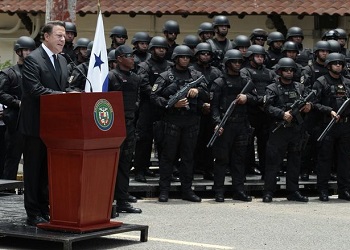Panama may be moving away from a softer approach to its gang problem toward a more firm-handed and potentially violent strategy resembling those of its Northern Triangle neighbors, at a time when the sophistication of local criminal groups could make such confrontation with the state significantly more dangerous.
Following a spate of violence in the Caribbean port city of Colón, Panamanian President Juan Carlos Varela has announced that the government will “strengthen the security strategy” in Colón.
Prensa Latina reported that this will involve Task Force Eagle (Fuerza de Tarea Águila), an elite team of 300 troops created in late March to fight organized crime “with a firm hand.”
SEE ALSO: Coverage of Security Policy
The measure was precipitated by at least four murders, including that of national soccer team member Amílcar Henríquez in Colón, a city that is allegedly home to over 40 gangs. Varela consequently called an emergency security council to discuss “extraordinary measures” against criminal networks, claiming gangs were responsible for the recent murders.
National Police Director Omar Pinzón in turn announced an increase in the number of agents on the ground, according to Prensa Latina.
There were 89 homicides in Panama over the first two months of 2017, up 22 percent from the same period in 2016.
InSight Crime Analysis
For years, Varela has strongly advocated a less punitive approach to gangs in the form of his signature youth rehabilitation program, Secure Neighborhoods (“Barrios Seguros”). Yet the president’s latest declarations may suggest a tacit recognition that the plan has failed to weaken the country’s gangs. Between 2014 — when Varela took office and announced Secure Neighborhoods — and 2016, the number of gangs in Panama did not change at all, according to official estimates.
While Varela has also adopted some heavy-handed tactics in addition to Barrios Seguros, including large police operations, the new task force may represent a particularly aggressive policy turn. Superficially, the crackdown, which focuses mainly on critical areas of Panama and Colón provinces, makes sense. These are the areas of highest gang presence and also where the most homicides occur. (See map below)
SEE ALSO: Coverage of Homicides
However, homicides in Panama are not attributable solely to local gangs. And the adoption of strong-armed tactics may actually further deteriorate the security situation. Panama’s Northern Triangle neighbors (Guatemala, El Salvador and Honduras) and Mexico provide perhaps the starkest example of “iron fist” approaches contributing to persistently high levels of violence rather than solving them. Moreover, some analysts believe these strategies could simply have a “balloon effect,” displacing gangs from one zone to another.
This is a critical time for Panamanian organized crime. Not only are gangs consolidating into more sophisticated, powerful blocs, but an unprecedented surge in cocaine production in the country’s southern neighbor, Colombia, will inevitably intensify drug trafficking activity on Panamanian soil. As dynamics evolve, local gangs could see a larger influx of money and weapons, making any battle with the state a potentially more explosive one.

Graphic previously published in an October 2016 article.

